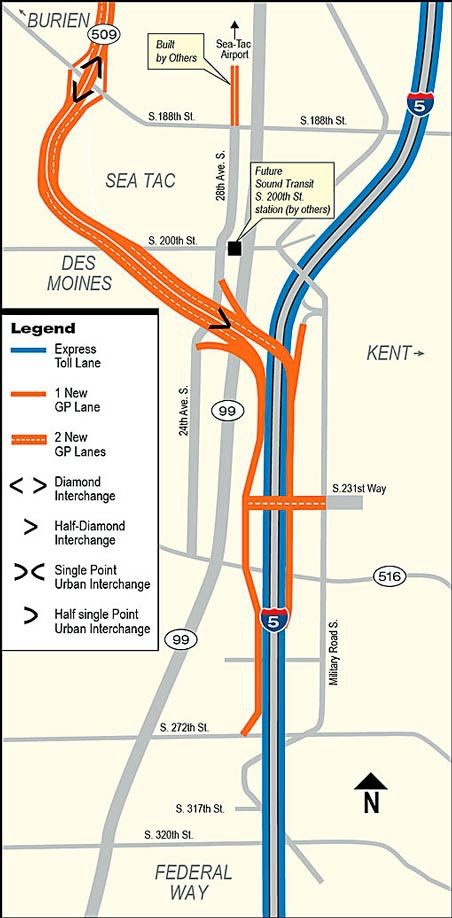For the Reporter
The state’s proposed Puget Sound Gateway project for Highway 167 and State Route 509 ranks as one of the 12 most wasteful highway expansion projects in the nation, according to a recent study by the United States Public Interest Research Group.
The new study details how despite America’s massive repair and maintenance backlog, and in defiance of America’s changing transportation needs, state governments across the country, including Washington state, continue to spend billions each year on new and wider highways, according to a media release about the study. The study shows how some of these highway projects are outright boondoggles.
“Washington state continues to prioritize wasteful highway expansion projects that fail to effectively address congestion while leaving our roads and bridges to crumble,” said Bruce Speight, WashPIRG Foundation executive director. “This in turn saddles future generations with massive repair and maintenance backlogs that only grow more painful and expensive to fix the longer we wait to do so.”
The Puget Sound Gateway project will cost an estimated $2.8 billion and will expand Highway 167 in Tacoma and State Route 509 from SeaTac to Kent at Interstate 5.
According to the most recent federal data, 22 percent of major roads in Washington State are in poor condition. However, the state continues to focus on highway expansion, spending an average of 84 percent of available funding on expansion and only 16 percent on repair. At the same time, transportation behavior is changing.
“The last thing that Washington needs now is another highway boondoggle,” said Clark Williams-Derry, a senior researcher with the Seattle-based Sightline Institute. “Fixing streets and bridges is more responsible, both fiscally and environmentally, than building new highway capacity.”
The state Department of Transportation says the project benefits include:
• Relieving traffic congestion and completing critical freight links between the ports of Seattle and Tacoma and key distribution centers, warehouses, and industrial areas in King and Pierce counties.
• Supporting regional job growth and economic growth at the state’s two largest ports.
• Improving regional mobility and relieving congestion on local roads and highways by providing new, more efficient travel options.
• Supporting master land use plans and economic development plans developed by cities in the Gateway corridors.
The city of Kent will receive $15 million from the state as part of the Gateway project to help fund a railroad-vehicle grade separation along South 228th Street at the Union Pacific tracks to make a smoother connection to I-5 and State Route 509.
Meanwhile, the public research group claims the project fails to account for changing transportation trends.
“America’s long-term travel needs are changing, especially among Millennials, who are driving fewer miles, getting driver licenses in fewer numbers, and expressing greater preferences to live in areas where they do not need to use a car often,” said Tony Dutzik, senior policy analyst at Frontier Group. “Despite the fact that Millennials are the nation’s largest generation, and the unquestioned consumers of tomorrow’s transportation system, Washington state is failing to adequately respond to these changing trends.”
The study recommends that states:
1. Adopt fix-it-first policies that reorient transportation funding away from highway expansion and toward repair of existing roads and bridges;
2. Invest in transportation solutions that reduce the need for costly and disruptive highway expansion projects by improving and expanding public transit, biking, and walking options;
3. Give priority to funding transportation projects that reduce the number of vehicle-miles people travel each year, thereby also reducing air pollution, carbon emissions, and future road repair and maintenance needs;
4. Include future maintenance costs, a range of potential future housing and transportation trends, and the availability of new transportation options such as car-sharing, bike-sharing, ride-sharing, and transit in transportation project selection decisions;
5. Invest in research and data collection to better track, and more aptly react, to ongoing shifts in how people travel.
Talk to us
Please share your story tips by emailing editor@kentreporter.com.
To share your opinion for publication, submit a letter through our website https://www.kentreporter.com/submit-letter/. Include your name, address and daytime phone number. (We’ll only publish your name and hometown.) Please keep letters to 300 words or less.

